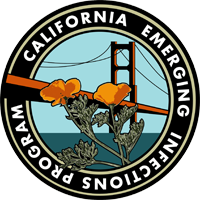Overview
The California Emerging Infections Program has provided support for flexible responses to urgent public health threats since 1994. CEIP has conducted rapid assessments of disease rates (e.g., rapid survey for cases of variant CJD in California, 1998), supported local and national partners in 2003 during the SARS investigation, assisted the CDPH Immunization Branch in the investigation of a resurgence of pertussis cases in California (2010), assisted multiple branches of CDPH and CDC in response to the SARS-CoV-2 pandemic (2020), and has continued to assist local health jurisdictions in foodborne outbreak investigations as needed.
In the first six months of 2013, CEIP assisted CDPH with 28 cluster investigations of PFGE-matched Salmonella, E. coli 0157:H7, and Listeria. The flexible response team solicited clinical information and exposure data on these cases and forwarded the information to CDPH. CEIP staff have continued to generate exposure estimates based on the FoodNet population survey and administer supplemental interviews in English and Spanish as requested by CDPH and local health jurisdictions.
Objectives
CEIP staff participate in workgroups convened by CDC in response to unpredictable emerging infectious disease threats. We assist in guiding responses, study design, and completing such studies in a timeframe defined by CDC. Experience with novel H1N1, Clostridioides difficile, methicillin-sensitive and -resistant Staphylococcus aureus, carbapenem-resistant Enterobacterales, Mpox, H5N1, and numerous foodborne outbreak and cluster investigations has shown that CEIP staff are able to prioritize urgent work on emerging infectious disease problems while continuing to conduct active surveillance for the core projects.
Staff at CEIP provide support as needed and assist in investigations of urgent emerging and re-emerging diseases in conjunction with CDC and the California Department of Public Health Division of Communicable Disease Control, Microbial Diseases Laboratory, Infectious Diseases Branch, and Immunization Branch. All CEIP staff have been cross-trained to address emerging threats by ramping up surveillance, providing bilingual Research Assistants for interviews, and having Project Coordinators, Epidemiologists, and Surveillance Officers trained to conduct rapid surveys and data analyses under the direction of the Program Directors. CEIP works with collaborating agencies to provide rapid turnaround in survey and study development, implementation, and analysis.
Contact
For questions about flexible response, please email info@ceip.us.
